Roundup is one of the most popular weed killers on the market, and for a good reason: it works quickly and efficiently to kill weeds. However, Roundup can have side effects like any other product if used incorrectly. That’s why it’s important to know the instructions for using a Roundup 2-gallon sprayer and the diagram and manual that come with it. We also discuss replacement parts for the sprayer, so you can keep it running smoothly. Let’s get started!
Are you tired of the old hose sprayer you have to fill with a bucket? A 2-gallon sprayer is a perfect solution if you want an upgrade. A 2-gallon sprayer is ideal for general-purpose spraying when working around your home or in your gardens.
- For all your home and garden needs - Controlling Insects and Weeds or Cleaning Decks and Siding; Easy one-step assembly. Fill, pressurize, and spray.
- Safe, pressure release cap sends vapors and liquids down and away before top is opened.
- Kills and prevents weeds for up to 12 months by creating an invisible barrier in the soil
- Kills weeds to the root. Guaranteed!* *Consumer Guarantee: If for any reason you are not satisfied after using this product, simply send us original proof of purchase and we will refund the purchase price.
Last update on 2024-12-21 / Affiliate links / Images from Amazon Product Advertising API
Main Features
Roundup 2-Gallon also has several other features that make it special, such as easy adjustment (it can be dialed in no matter how you hold the bottle), range extension up to 36 feet (10 meters), high gallon capacity (up to 2 gallons/6 liters), quick release nozzle system, side discharge option, and detachable stake capability. All of these features make the Roundup backpack sprayer a great investment if you’re looking for an efficient way to take care of your lawn or garden.
Efficient Pump
The pump is lightweight and has a very nice design. It’s also fairly compact, which makes it easy to carry around. The pump handle does make a strange noise when pumped. Fortunately, this indicates a good fit and is not an issue. The sprayer has no leaks—a great garden sprayer for watering your lawn.
This sprayer pump assembly is constructed to fit 2-gallon sprayer tanks. Its simple design consists of a 4-inch diameter internal filter with a check valve and an in-tank non-clogging venturi.
Roundup Sprayer Nozzle
You can try both of the nozzles at various solid stream strengths. I found the cone-shaped poly adjustable nozzle is sufficient for any fine mist and the aluminum wand with comfort grip is good for more intense bursts. This roundup weed sprayer model has various spray nozzles ranging from wonderful mist to larger bursts and sprays.
Perfect for weed control projects
What’s the best way to dilute weed killers? From the outside, this model looks like a standard gallon-sized sprayer with weed killer. But it’s a gadget that lets you add your water for a customized mixture that suits your preference and works even better. You can spray the product both for weeds and weed control projects. You will love this roundup backpack sprayer.
Continuous Spraying
For efficient spraying measurement, the 1-gallon and 2-gallon markings on the roundup tank sprayer container should be highlighted. The product delivery is quick and very easy to use. The user manual is pretty clear, and a few pumps will give you enough pressure to do your job efficiently. The best part about this product is that it comes in a compressed container, with an efficient container that works as designed.
5-star Rating Model
Roundup has always been the leader in herbicide and pesticide product performance. This basic multi-purpose trigger sprayer has nicer features like liquid control technology. This roundup garden sprayer is uniquely designed to deliver all the performance of Roundup Concentrate and the convenience of a multi-purpose trigger sprayer.
Long-lasting Sprayer Hose
This 2-gallon roundup sprayer hose is strongly made and will last long. Though it does hold up well in cold weather, If you plan to use this for spraying, it is best to wait until the weather gets warmer. When the spray stops working, you need to disassemble the spray hose. Then, clean it thoroughly and retighten each connector to the tank before using it again.
The Roundup hose is longer than I expected. It felt well-built and durable, but the plastic hose is not nearly as flexible as the metal hose or hose that came with my lawn mower and may take a bit of time to get completely straightened out after rough handling during shipping.
Refilling Process
When refilling your compression sprayer, unscrew the cap to release the pressure. Then, the pressure valve will open automatically to prevent accidental spray. The sprayer also has a no-spill semi-translucent funnel top tank with an easily visible liquid level and a comfort-grip pump handle for easy operation. A one-gallon tank is a much more eligible item than a 2-gallon tank.
This polyethylene plastic tank sprayer lasts for hundreds of spray sessions, and its affordable price is great compared to other sprayers.
- Turn the machine off by unplugging it from the wall and removing the top cover.
- Remove the screws that hold the reservoir in place and remove them.
- Locate the refill tube and unscrew it from the base of the reservoir.
- Fill up the reservoir with water until it is full, screw on the refill tube, and replace the top cover.
- Replace the screws that hold the reservoir in place and plug in your machine to power it on.
Roundup Sprayer Parts
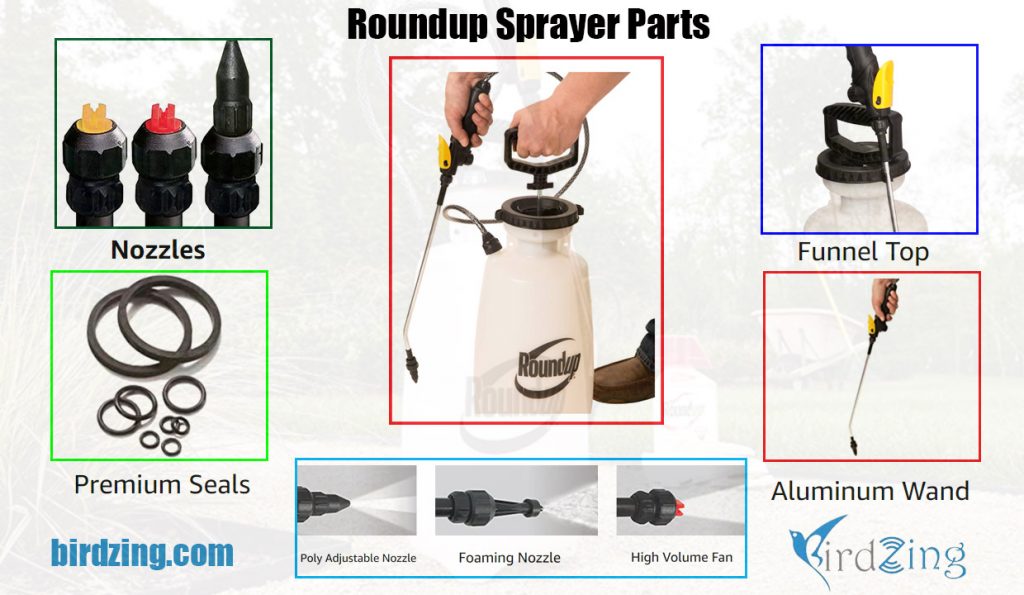
Some more information about Roundup Backpack Sprayer Parts
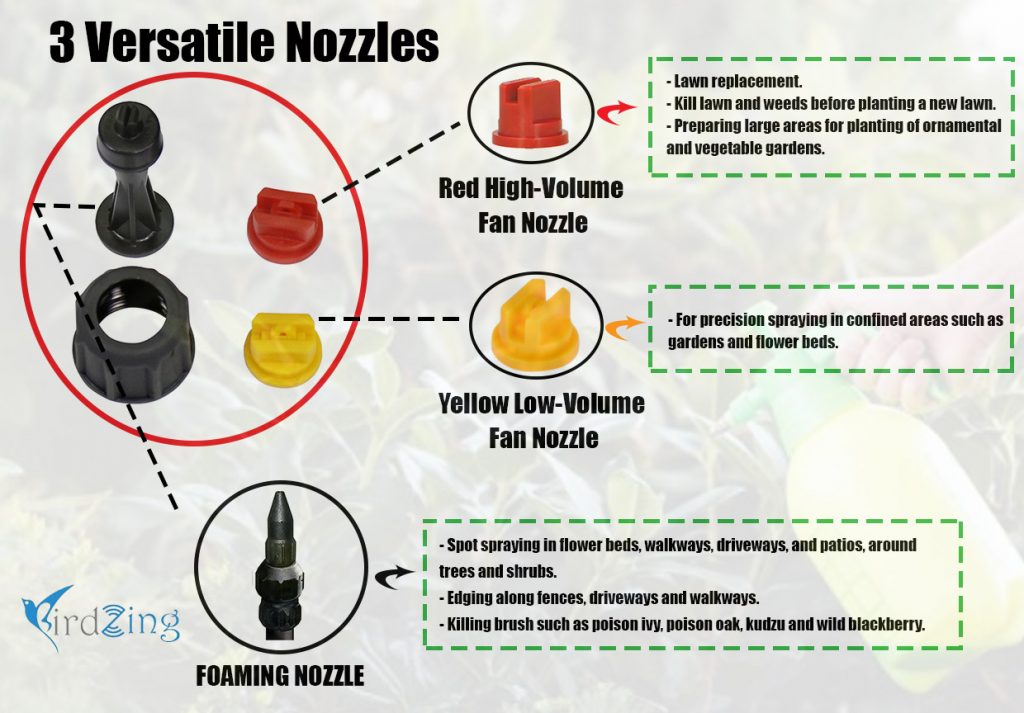
Roundup 2 Gallon Sprayer Instructions
If you are interested in buying a Roundup 2 Gallon Sprayer, then there are some instructions that you need to follow.
First, measure the length of your garden hose and cut it accordingly so it can fit into the sprayer. Then fill up the sprayer with water and spray on a small part of your lawn or garden to test if it works properly.
Next, attach the ground wand and plug in the power cord. Attach the nozzle by sliding on one side of the trigger, turning it clockwise until tight enough for easy use.
Finally, shake well before use, and do not use without cleaning or disinfecting first.
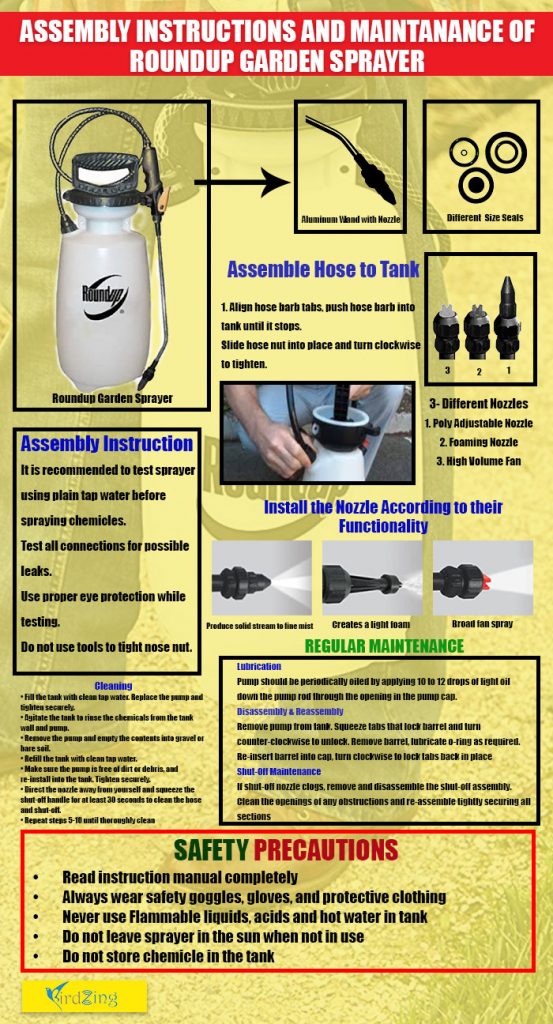
Roundup 2-gallon Sprayer Parts Diagram
The diagram below shows the parts of a Roundup 2-gallon sprayer.
- The black plastic tube is the sprayer hose that attaches to the pump and the water reservoir.
- The round valve on top of the black plastic tube opens when you turn it clockwise, releasing pressure to fill your sprayer with water.
- The white plastic handle at the bottom of the black plastic tube controls water flow from your sprayer hose into your desired area.
- The blue rubber cap on top of this white handle ensures that no air enters or leaves through this opening and will also help prevent leaks when you’re not using your sprayer for a long period.
Roundup Pump Sprayer is not working.
There are a few possible reasons why the pump sprayer might not work. One of the most common is that the spray nozzle might be clogged with dirt or debris, preventing it from spraying water.
Another reason is that there may be a blockage in the hose which prevents water from reaching the spray head. A third reason is that an air leak may allow air to enter and prevent water from entering.
If you have determined that your pump has a blockage or an air leak, you can fix these problems by trying to clear out any obstruction in the hose and ensuring no more air enters it.
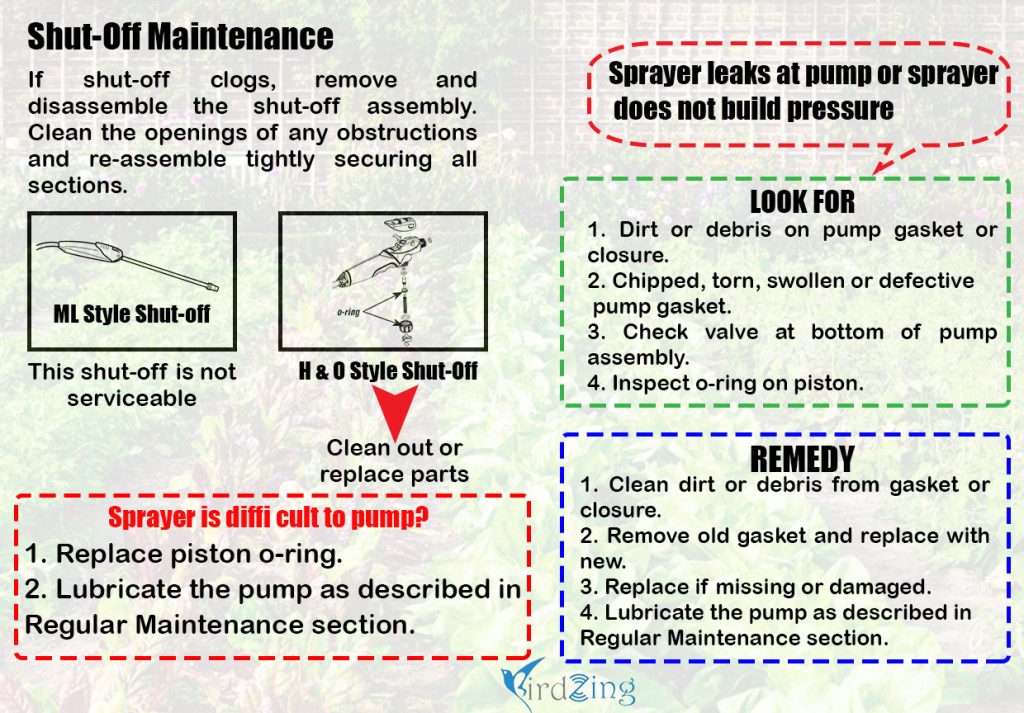
Roundup Sprayer Wand not Working
- Spray the wand with a small amount of water.
- Make sure the sprayer is fully connected to the trigger handle, making sure there are no kinks in the hose.
- Check for obstructions on the nozzle end of the wand and ensure it’s clear from dirt or debris that may be blocking the flow of water through it, as well as clogging up the sprayer’s filter screen if one is present.
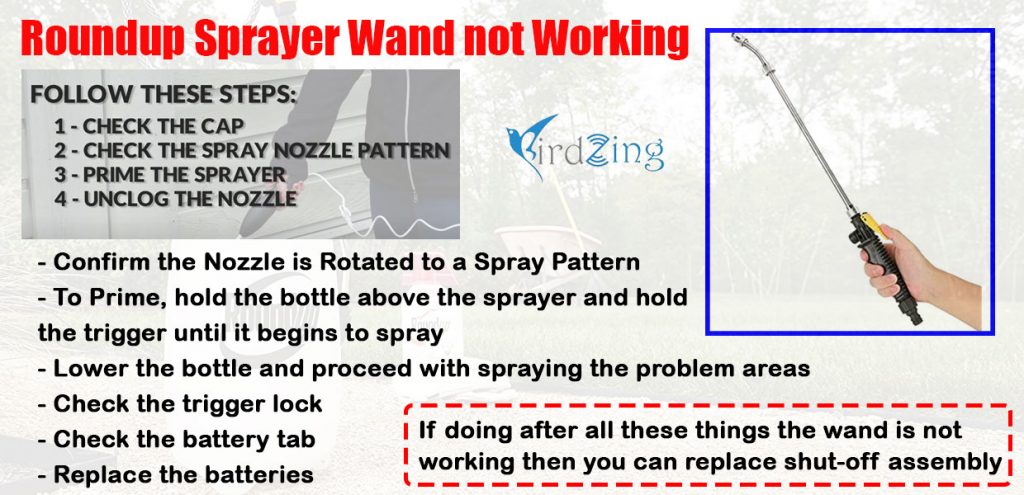
Why is my roundup 2-gallon sprayer not working?
To re-prime, the sprayer put a little back into the tank and let the trigger work for about 30 seconds. Avoid cleaning agents such as soap and water to maximize the likelihood of successful nozzle-cleaning.
There could be a few reasons why the roundup sprayer is not working.
- The hose might be clogged. Check to see if any debris or mud is blocking the water flow. If so, clear it away using a garden hose or pipe cleaner.
- The pump might be defective. If the pump is not turning on, it may need to be replaced. You can find a roundup sprayer pump replacement.
- The switch might be defective and need to be replaced. You must remove the machine’s top cover and access the switch inside (see instructions below).
- There could be an issue with the hose connection at the back of the machine or with the wand itself (the part that sprays). In this case, you will need to replace either one of these components for the machine to work properly again.
How to open a roundup sprayer for a refill?
Turn the pump handle to its highest speed and firmly press down on the handle to lock the lid into place. Push the handle clockwise until it is fully engaged, and lock it into place so it cannot be unscrewed. The most challenging part about this step is usually finding a spot that doesn’t scratch the paint when you do it.
How to use a roundup sprayer?
Press the pump handle 25-30 times to pressurize the bottle. Bring it to full pressure once the fluid level reaches a half-full mark. After the bottle is pressurized, hold the pump down and turn it counterclockwise to secure it.
What is the best time to spray roundup?
The best time to spray roundup is when the weeds are actively growing. It would be best if you sprayed during early spring, summer, and fall.
You can also use a pre-emergent herbicide like glyphosate or 2,4-D to kill weeds before they have a chance to grow out of control.
How to unclog the roundup sprayer?
There are two ways to unclog a roundup sprayer.
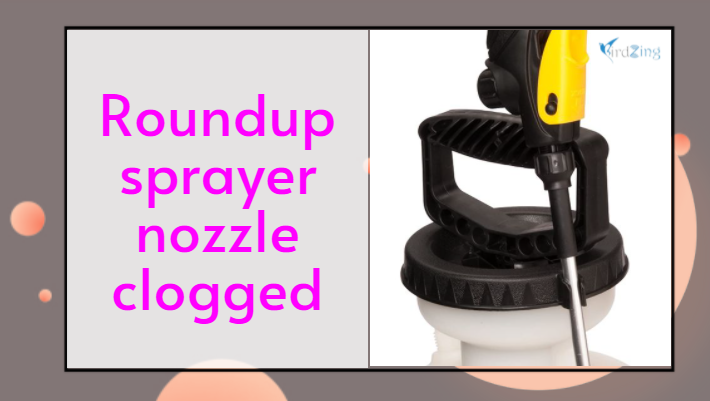
- The first way is to use your hand and push the nozzle toward the hose. You will be able to see the fluid coming out of the pipe. Once you’ve done this, grab the other end of the pipe and pull it towards you while pushing down on it with your hand.
- The second way is to remove both nozzles from their respective pipes and then try turning them in opposite directions until they click into place.
How to fix the roundup sprayer?
There are a few things that you can do to fix the roundup sprayer:
- Check the belt for wear and tear.
- Check the clog in the line.
- Remove any obstructions in the line, such as leaves, twigs, or debris.
- Replace the filter if it is dirty or needs to be replaced.
- Clean and lubricate all moving parts of the sprayer using a quality herbicide/weed-killer lubricant.
Once you have cleaned and lubricated the sprayer, do a final check of all moving parts. If necessary, replace any damaged or worn components, such as belts and brushes that spin in empty areas, to complete the job.
How to depressurize Roundup Sprayer?
There are a few ways to depressurize a Roundup Sprayer. The most common way is to turn it off and open the valve to let the pressure escape. Another way is to remove the nozzle, turn it upside down, and unscrew the valve.
- Turn off the power to the sprayer.
- Remove the gas cap and remove any air in the tank.
- Open the valve on the bottom of the tank and depressurize it by turning it counterclockwise until it stops turning.
- Replace the gas cap and turn on the power to the sprayer.
Roundup Sprayer Replacement Parts
There are many types of replacement parts for the Roundup sprayer.
The first is the part used to connect the tank to the sprayer. This part is called a reducer and has a connector piece with three holes in it. The other type of replacement part for the Roundup sprayer is the tip, which has an attachment piece with two openings on it.
Where can I find Roundup Sprayer Replacement Parts?
Last update on 2024-12-03 / Affiliate links / Images from Amazon Product Advertising API
You can find Roundup Sprayer Replacement Parts at most hardware stores or online retailers. Read the product reviews before purchasing to ensure you get the right part for your sprayer.
Roundup 2-gallon Sprayer Manual
The Roundup 2-gallon Sprayer Manual is a step-by-step guide to spraying your lawn. It will help you know how to spray the right amount of pesticide, adjust nozzle settings, and use other tools like the sprayer wand.
Spraying your lawn is not as easy as it sounds. This manual will teach you all about spraying pesticides to protect your family and pets from harmful chemicals while also giving your lawn a healthy appearance.
Roundup Sprayer Nozzle Replacement
To answer this question, we need to understand what is a Roundup sprayer nozzle replacement.
A Roundup sprayer nozzle replacement is the part of the hose that connects the trigger on your sprayer with the tank and helps control the liquid flow. This part aims to help you get a better water flow for spraying herbicides or pesticides onto plants and trees to kill them.
It can be replaced by buying a new one or replacing it yourself by removing the old one and inserting a new one.
Final Words:
Roundup 2-gallon Sprayer is the most efficient way to spray weeds. This weed control equipment has a strong water pressure and a large capacity for spraying solutions. It can handle even the biggest weeds with ease. Roundup 2-gallon Sprayer comes with a complete set of parts, which are easy to replace so that you can use it for a long time without any problem.

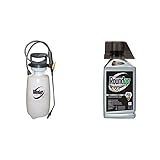




Pingback: 10 Best Garden Sprayer: Reviews in 2022: Buyers Guide & Tips